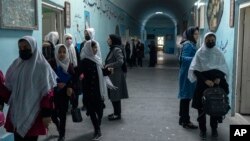Afghanistan’s Taliban said Friday they will allow all girls in grades seven and up to return to school next week, a move praised by the United Nations.
After the Islamist group seized power seven months ago, it only allowed boys to return to the classroom and barred girls across most Afghan provinces from doing so, citing financial constraints and a lack of arrangements needed to ensure gender-segregated education systems in line with Islamic Sharia.
The restrictions sparked fears the country’s new rulers would again ban women from education and work just like the Taliban did when they previously were in power from 1996 to 2001.
"I welcome the plan announced by the Taliban to reopen schools for girls & boys on 22 March, which must now be approved and implemented,” U.N. Secretary-General Antonio Guterres tweeted Friday. “All doors must be open for girls & boys to have an education and reach their full potential,” he added.
The Taliban’s education ministry has said all schools will reopen starting next week when the winter break ends, saying no schools will be closed in the country this year.
“As announced by the ministry of education, the schools will open,” senior Taliban official Suhail Shaheen told VOA. Shaheen is the Taliban’s permanent ambassador-designate to the U.N.
Female students have hailed the decision.
"I feel very powerful. We can show not only [the Taliban] but also the world [that] we never stop, and Afghanistan won't return to previous decades," Farzana, a 17-year-old student, told Reuters news agency while talking about returning to school.
“Our one educational year was wasted due to changes in Afghanistan, and we couldn’t study. I hope to graduate from school and attend university,” Shila, a 16-year-old student, told the local TOLO news channel.
Since taking control last August, the Taliban have assured the global community repeatedly they would govern Afghanistan differently this time around, and women would be given access to education as well as work.
Despite those pledges, the global community remains skeptical and critical of the male-only Taliban government in Kabul, saying it lacks inclusivity. The hardline group has also placed restrictions on Afghan women, drawing criticism from human rights groups.
Afghan women who attend universities are required to wear a hijab in class and are being taught separately from males. Taxi drivers are ordered to refuse a ride to female passengers not wearing hijabs, and women are not allowed to take long road trips unless accompanied by a close relative.
Human rights and terrorism-related concerns have kept foreign governments from recognizing the Taliban as the legitimate rulers of Afghanistan.
Meanwhile, Shaheen welcomed Thursday’s U.N. Security Council resolution formally extending and enhancing the role of the world body in Afghanistan for another year.
The resolution makes human rights, especially those of women, girls and minorities, a top priority for what is known as the U.N. Assistance Mission in Afghanistan or UNAMA. It also highlights the importance of inclusive governance and the “full, equal and meaningful participation of women.”
There is no mention of the Taliban by name in the resolution, nor of the “de facto authorities” as they are often referred to.
“UNAMA renewal is an appropriate decision by UNSC,” Shaheen told VOA.
“But recognition of the current government and handing over the Afghanistan seat to the current government is also essential because in that case, UNAMA will be dealing with a recognized government to facilitate humanitarian assistance and engage with,” he said.
A chaotic military withdrawal of the United States and allied countries in late August after 20 years has worsened a humanitarian crisis in Afghanistan stemming from war and persistent drought.
The Taliban takeover prompted Western countries to immediately halt non-humanitarian financial assistance to the aid-dependent country and impose banking restrictions, pushing an already fragile economy to the brink of collapse.
Nearly two-thirds of Afghanistan’s population — about 23 million people — need humanitarian assistance. That’s up 30% from one year ago. The World Food Program says 9 million Afghans are just one step away from famine.




